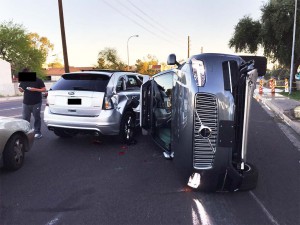
Looks like its going to take Waymo rides, er, way more rides in Waymo's autonomous minivan to change opinions.
Even as automakers rush to bring autonomous and completely self-driving vehicles to market, perhaps as soon as the end of the decade, there’s a deep distrust of the technology, with more than four out of 10 Americans saying they “would never ride in a fully automated vehicle.
The lack of trust runs deep, according to Robert Lajdziak a researcher with J.D. Power and Associates, which conducted the new study in partnership with the National Association of Mutual Insurance Companies, or NAMIC. Significantly, just as federal regulators have announced plans to ease restrictions on testing autonomous vehicles on public roads, those surveyed by Power and NAMIC questioned whether the government – as well as automakers and tech companies – can properly ensure the safety of the public.
The new study likely reflects the fact that “people’s opinions have been swayed” by recent incidents involving semi- and fully autonomous vehicles, including a fatal Uber crash earlier this year in Tempe, Arizona, said Lajdziak, in an exclusive interview with TheDetroitBureau.com ahead of the release of the new study.
But even without the extensive media coverage of those crashes, skepticism would be broad, the Power researcher said, much as it is for most new technologies that consumers have yet to directly experience.
(Honda implementing new tech to make smart intersections. Click Here for the story.)

A new study suggests that most people will not feel as confident in self-driving vehicle as this guy napping in Waymo's minivan.
The study found fully 15% of the American public “don’t believe there will ever be an autonomous vehicle on the market, and 42% said they would never ride in a fully automated vehicle,” Lajdziak said, adding that even among those who would be willing to take a ride, more than half want to see the technology on the road for more than a decade before they would be willing to try it out.
Prior studies have found that the public is far less tolerant of failures by autonomous technology than in conventional, human-operated vehicles. That carries over into the new research that found even among those who would be willing to ride in a robot car or cab, “the overwhelming number of customers said they would demand a 100% reduction in accidents – in other words, no accidents at all – before they would ride in one,” said Lajdziak.
While 56% of those surveyed would demand 100% safety before they would take a ride, 60% said they’d demand the same level of safety before letting a family member ride in a fully autonomous vehicle.
The new Power/NAMIC study found attitudes varied significantly among different groups. Those 65 years of age and older were the least likely to say they’d try out an autonomous vehicle, while those 35 and under were far more interested in going for a ride, nearly a third saying they’d try it out within two years of the technology coming to market.
But age wasn’t the key factor in people’s attitudes. Those most open to autonomous technology tend to live in urban environments, said Lajdziak.
(To see more about why most drivers don’t know how to use smart safety tech in cars, Click Here.)

Police blamed the other driver for this crash with an Uber vehicle, but the incident still raised concerns about the ability of an autonomous car to steer clear of a crash.
“Chalk it up to a general acceptance of new technology,” he said, “and younger consumers tend to live in urban areas and use ride-sharing services.” But when the same questions were posed to older consumers living in urban areas and familiar with ride-sharing services, “they were much more accepting, as well.”
The study found a fair level of cynicism among consumers about autonomous technologies. Proponents typically promise that self-driving vehicles will deliver a sharp improvement in highway safety while also helping to address urban congestion. But the majority of those who responded to the new study said the real reason is to increase profits for auto, tech and insurance companies, while bringing in more revenue for government.
And when asked who they would trust to make sure that autonomous technology is safely and adequately being tested, consumers said they didn’t trust any of those entities. They specifically said they would most likely trust an independent organization like the Insurance Institute for Highway Safety.
The new Power/NAMIC study raises questions about the speed with which automakers and tech firms – with federal support – are racing autonomous vehicles to market, Lajdiak cautioned. That said, he added that the pessimistic public view could actually begin to soften once the technology becomes a viable reality.
(Loss of control, viruses top safety hurdles for autonomous vehicles to clear. Click Here for more details.)
“Through all of our research we’ve seen this as a trend across new technology: (support) starts very low … but once it hits critical mass (support) accelerates,” Lajdziak said. “What I would expect to see is that once people see autonomous vehicle and ride one in a public arena we’ll see interest rise and then their willingness to adopt the technology.”
